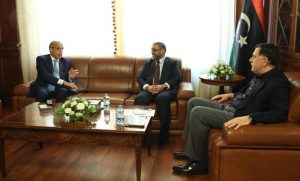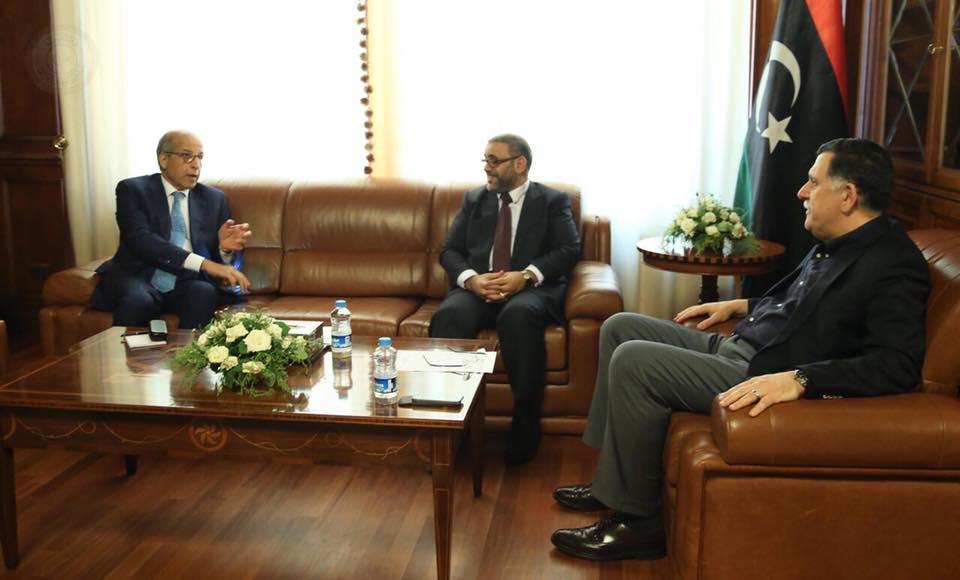By Sami Zaptia.

London, 17 August 2018:
Faiez Serraj, the head of Libya’s internationally-recognized Presidential Council and Government of National Accord (PC/GNA), met Wednesday at his Tripoli headquarters with both the head of the High State Council (HSC), Khaled al-Mishri, and the Governor of the Tripoli-based Central Bank of Libya, Saddek El-Kaber.
The PC/GNA Media Office said the meeting wss part of the follow-up to the ‘‘final steps of the economic reform programme and the early commencement of its implementation’’.
The report stated that the meeting stressed the concern that the reform package should be in the interest of the Libyan citizen, relieve the economic burden on the Libyan, and at the same time restrain the black-market.
The meeting also stressed that food security is one of the most important national priorities of the Libyan state and expressed the concern that these reforms should contribute to the provision of basic goods, ensure their access to the citizen at appropriate prices, and gradually recover the Libyan economy.
It will be recalled that an economic reform plan for Libya was finally agreed by the contending Libyan parties at the Libya Economic Dialogue meeting in Tunis – on 5 June this year. That was the eight such meeting organized to try to get the fractious Libyan parties to agree to a unified economic reform plan.
The meeting was organized by the US embassy to Libya and was attended by the then US Chargé d’Affaires, Stephanie Williams.
The meeting had agreed on four main economic measures designed to ease pressure on state spending and help alleviate the current economic burden on Libyan citizens, and especially the poorer sections of Libyan society.
The four measures are:
1) The reduction of subsidies on fuel and increasing its price from the current LD 0.15 a litre (about US$ 0.11¢ a litre at the official exchange rate).
2) The increase of the amount of the foreign currency annual allowance at the official rate of exchange, currently set at $500 per person.
3) The reactivation of the child allowance which has been frozen due to lack of state funds.
4) The devaluation of the Libyan dinar.
An ambitious target was set for the implementation of the plan, with the economic reforms planned to be in place by the end of July 2018.
On 9 June, the Tripoli CBL announced that it had agreed a three-tracked framework for the reform of the Libyan economy with the PC/GNA and the HSC.
The CBL had said that a ‘‘practical framework for conducting the economic reform agreed upon at the recent economic dialogue sessions held in Tunis through three tracks has been agreed’’.
These are;
1- Solving the Libyan dinar exchange rate issue through the imposition of fees on foreign currency sales and transfers.
2- Reforming subsidies.
3- Establishing a compensation mechanism to mitigate the repercussions and effects of the economic reform decisions on the livelihood of Libyan citizens.
However, the capturing of the eastern Crescent oilfields by former Petroleum Facilities Guard Ibrahim Jadran and the recapturing of the oilfields and their handover to the eastern-based National Oil Corporation by the Khalifa Hafter-aligned Libyan National Army – had put in doubt the implementation of any agreed economic reforms. Not least due to the damage caused by the military attack to oil infrastructure and the resultant loss of revenue to Libyan state coffers.
Nevertheless, at a 5 July Tripoli press conference, the Tripoli-CBL assured that the agreed economic reforms would go ahead.
On another note, it must also be kept in mind that Mishri, the head of HSC, had granted the CBL Governor Kaber a limited period of time in which to implement the agreed economic reform.
The inference from the warning was that if Kaber did not agree to implementing the reforms, he would be replaced. This comes on the background that the Tobruk-based House of Representatives had already ‘‘replaced’’ Kaber by another Governor.
https://www.libyaherald.com/2018/07/09/cbl-to-continue-with-agreed-economic-reforms/
https://www.libyaherald.com/2018/06/11/cbl-sets-framework-for-economic-reform-agreed-at-tunis-meeting/
https://www.libyaherald.com/2018/05/29/hsc-grants-tripoli-cbl-governor-limited-time-to-implement-economic-reforms/
https://www.libyaherald.com/2018/05/29/hsc-grants-tripoli-cbl-governor-limited-time-to-implement-economic-reforms/
https://www.libyaherald.com/2018/04/04/low-international-participation-at-tripoli-international-fair-as-minister-promises-economic-reforms/
https://www.libyaherald.com/2017/05/25/libyas-private-sectors-call-for-radical-economic-reform-at-tripoli-meeting/
https://www.libyaherald.com/2017/04/02/tunis-meeting-on-economic-reform-and-gna-funding-fails-to-make-significant-headway/
https://www.libyaherald.com/2017/11/09/cbl-claims-progress-on-financial-reform-in-tunis-economic-dialogue-meeting/
https://www.libyaherald.com/2018/07/19/pc-member-majbri-suspends-membership-from-gna-until-real-political-and-security-reform-is-implemented/








